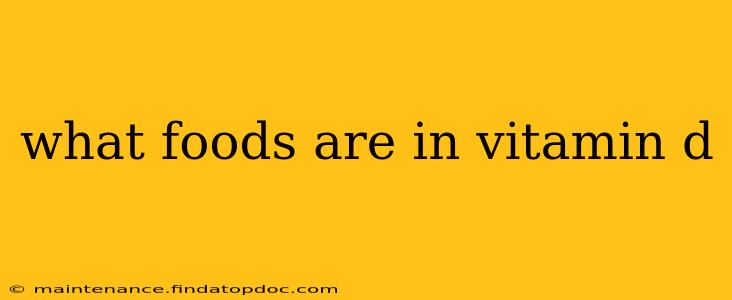What Foods Are High in Vitamin D? A Comprehensive Guide
Vitamin D, often called the "sunshine vitamin," plays a crucial role in calcium absorption, bone health, immune function, and even mood regulation. While sunlight exposure is a primary source, incorporating vitamin D-rich foods into your diet is essential for maintaining optimal levels. However, it's important to understand that naturally occurring vitamin D in food is relatively rare. Most foods are fortified to boost their vitamin D content.
What foods naturally contain vitamin D?
The truth is, very few foods naturally contain significant amounts of vitamin D. Fatty fish are the best natural sources.
-
Fatty Fish: Salmon, tuna, mackerel, and sardines are excellent sources of vitamin D. A 3-ounce serving of these fish can provide a substantial portion of your daily recommended intake. However, the exact amount varies based on the type of fish and its preparation.
-
Egg Yolks: Egg yolks contain a small amount of vitamin D, but it's not a significant source compared to fatty fish.
-
Mushrooms: Some mushrooms, particularly those exposed to ultraviolet (UV) light during growth, contain vitamin D2. However, the amount varies greatly depending on growing conditions.
What foods are fortified with vitamin D?
Fortified foods are a much more reliable source of vitamin D for most people. Manufacturers add vitamin D to enhance the nutritional value of these products.
-
Milk and Milk Alternatives: Many brands of cow's milk, almond milk, soy milk, and oat milk are fortified with vitamin D. Check the nutrition label to confirm the vitamin D content.
-
Orange Juice: Some orange juice brands are fortified with vitamin D. Again, always check the label.
-
Cereal: Many breakfast cereals are fortified with vitamin D, along with other essential vitamins and minerals. Pay attention to the serving size and the amount of vitamin D per serving.
-
Yogurt: Many yogurts, especially those marketed as "enhanced" or "fortified," contain added vitamin D.
-
Tofu: Some brands of tofu are fortified with vitamin D.
How much vitamin D do I need?
The recommended daily allowance (RDA) of vitamin D varies depending on age and other factors. It's best to consult your doctor or a registered dietitian to determine your individual needs. They can assess your current vitamin D levels through a blood test and recommend the appropriate amount for you. Self-treating with high doses of vitamin D can be harmful.
Can I get too much vitamin D?
Yes, it's possible to consume excessive amounts of vitamin D, leading to hypervitaminosis D. Symptoms can include nausea, vomiting, weakness, and kidney problems. Always follow the recommended intake guidelines and consult a healthcare professional if you have concerns.
What are the best ways to increase my vitamin D intake?
The best approach is a combination of safe sun exposure (limited to prevent sunburn), consuming fortified foods, and potentially taking a vitamin D supplement under the guidance of a healthcare provider. They can help you determine if a supplement is necessary based on your individual needs and current vitamin D levels.
Are there any interactions between vitamin D and other medications?
Yes, vitamin D can interact with some medications. It's crucial to inform your doctor or pharmacist about all the medications and supplements you are taking before starting a vitamin D supplement.
This information is for general knowledge and does not constitute medical advice. Always consult with a healthcare professional before making any significant changes to your diet or supplement regimen. They can help you create a personalized plan to ensure you're getting the right amount of vitamin D to support your overall health.
